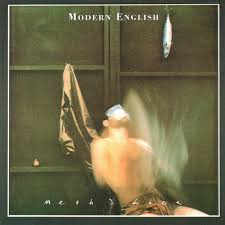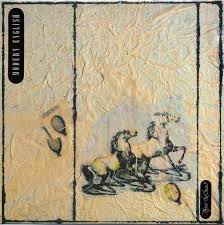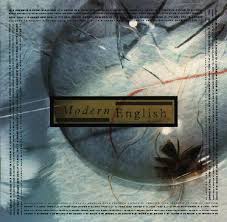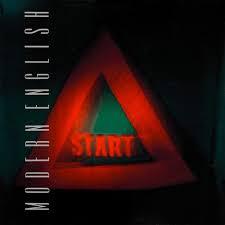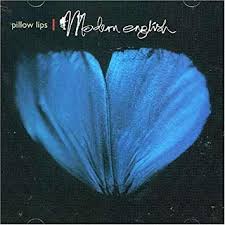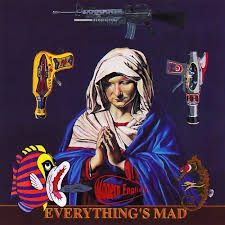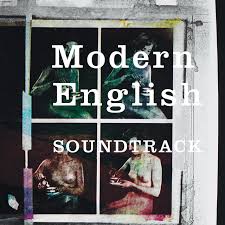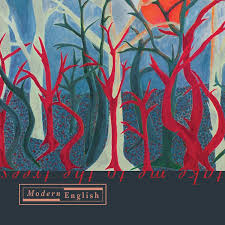Smiles and Laughter: A Retrospective of Modern English
Click below on the streaming service of your choice to listen to the playlist as you read along.
Similar to Dexys Midnight Runners, the band Modern English were an ‘80s act best known for one, career-defining song. And though “I Melt with You” wasn’t as much of a smash as “Come On Eileen,” any fan of ‘80s music – heck, if you own or listen to any ‘80s compilations – then you would have come across Modern English’s hit song. The rest of their catalogue, however, had a much lower profile in terms of charting success or maintaining a core audience, and therefore places this band comfortably in the Overlooked category.
My adoration of this band was built around their album, After the Snow, which I listened to extensively during my early teens. As always for me, it was because my older brother had it and I made a cassette copy to listen to in my Walkman. It took years for “I Melt with You” to achieve its established legacy and while it’s a great song, I puzzled over how the rest of the album was generally ignored. After the Snow was one of the most consummate new wave records, and though a little less synth-heavy than most music of that genre, the Brit accent on the vocals, the smooth melodies and danceable rhythms, and dark, moody overtones exemplified all of the its best elements.
Modern English, mixing post-punk and new wave
If there was anything that held Modern English back, it was perhaps the lack of a defining personality that could galvanize its fan base. As they moved their way through five albums over ten years, their sound moved with the times always offering a polished, competent, and while at times fantastic, not entirely enthralling example of the passing trends. This continued over another three LPs issued in the following 26 years, though in recent releases have run full-circle and found themselves returning to their original vibe, and thank heavens for that.
Modern English was formed in 1977 in Colchester, England, northeast of London and not far from where the English Channel meets the North Sea. The original trio of Robbie Grey (vocals), Gary McDowell (guitar), and Michael ‘Mick’ Conroy (bass) started as the punk band, The Lepers, before becoming Modern English when Stephen Walker (keyboards) and Richard Brown (drums) joined. In true punk DIY fashion they released a single, “Drowning Man,” on their own label in 1979 which led to their signing with 4AD Records. Two singles got them onto the UK indie charts before issuing their first LP, Mesh and Lace, in April 1981. It was in August, however, that better success came with another single, the fantastic “Smiles and Laughter,” which cracked the top twenty in the UK singles chart. It seemed they kept their best songs for the singles, and even the B-sides, which left the album as a weaker offering, though it was still a strong LP and managed a #5 spot in the UK indie albums chart. Their early sound looked to pick-up where Joy Division had left off, putting them solidly into the dark waters of post-punk along with early New Order, The Cure, Bauhaus, Killing Joke, and Echo & The Bunnymen.
First rule of a post-punk act: never be photographed in colour
Their sound made a solid and smart move forward with their second LP, After the Snow, issued in May of 1982. It was a much more consistent effort, keeping the three singles in the track listing to anchor a stellar batch of eight songs. The dark tones remained but the sound was fresher, more energetic, and more accessible as the keyboards and heavy bass were offset by bright guitar work and catchy melodies and beats. “Life in the Gladhouse” was the first single and was a pounding thrill, reaching #26 in the UK indie chart. It was followed by the single, “I Melt with You,” which reached #18 in the indie chart, not quite equalling their best result in “Smiles and Laughter.” In 1983, a third single, “Someone’s Calling,” was released but did less well. The album, surprising to me given my deep appreciation of it, only reached #13 in the UK indie chart, not doing as well as the debut and not cracking the main albums chart. However, unlike many of their fellow post-punk and new wave countrymen, they scored some success in the US with the LP reaching #70 in the album chart. This was undoubtedly due to “I Melt with You,” which caught on in college and alternative radio and was aided substantially by its prominent placement in the movie, Valley Girl, and regular rotation on the new cable station, MTV. The song reached a #78 spot in the US singles chart and the top ten in the US Rock chart. This exposure was undoubtedly also aided by having signed with major sub-label, Sire Records, for their US distribution.
Their association with 4AD resulted in Grey, McDowell, and Conroy participating in that label’s group effort, This Mortal Coil. In fact, it was 4AD’s founder Ivo Watts-Russell’s request for Modern English to make a recording of the medley they closed their shows with, “Sixteen Days/Gathering Dust,” that led to the formation of This Mortal Coil. Refusing to record the medley for a Modern English release, the band agreed to record it with other members of 4AD as a separate EP under This Mortal Coil. Joined by Cocteau Twins and Colourbox, the medley was issued in 1983 and backed with a cover of the Tim Buckley tune, “Song to the Siren,” recorded by Cocteau Twins but released as This Mortal Coil. The order was reversed for the 7” single, leading the new A-side “Song to the Siren” to become a minor hit. This prompted Watts-Russell to have This Mortal Coil record an entire LP, but without further involvement from Grey, McDowell, and Conroy. He had been unimpressed with their recording of their medley and it was also left off the album.
Oh, the ‘80s…
The next album, Ricochet Days, was released in 1984 and came after the band had moved to New York. The LP again moved the band’s sound further from their dark, post-punk vibe towards a purer new wave sound. “Chapter 12” got them into the top twenty on the UK indie chart again, “Hands Across the Sea” cracked the top 100 in the US singles chart, and the album equalled Mesh and Lace’s #5 spot in the UK indie albums chart. The album was pop, brighter, more synth-heavy, and put them solidly into the new wave category. It wasn’t as strong an album musically than its predecessors but made for an enjoyable listen.
The band parted with 4AD after Ricochet Days, resulting in the next LP, 1986’s Stop Start, being released by Sire only. The album completed Modern English’s transition into a full-fledged pop band. The album lacked edge or, for fans of their prior music, anything meaty to sink one’s teeth into. It was the first of their LPs to not chart at all in the UK and it only barely cracked the top 200 in the US. The single, “Ink and Paper,” didn’t chart. The album, thankfully, isn’t available on streaming services other than YouTube. I wouldn’t blame the band for disowning it; and though I don’t know if this was the reason, the album was so lousy I would think it was a catalyst for the band breaking up after its release. Surely, they must have been thinking they’d lost their way after moving their music from credible comparisons to Joy Division to something that bore more resemblance to Glass Tiger.
Modern English was re-formed in 1990 by Grey and Conroy, joined by a new member, Aaron Davidson, and this time on US label, TVT Records. They recorded the album, Pillow Lips, which found the band now sounding like a lukewarm version of Erasure or Soft Cell. The synths were now front and centre, leaving the sound generally shallow and lacking warmth. The songs were mostly banal pop tunes. Perhaps its most egregious entry was a straight-up re-recording of “I Melt with You,” which managed to suck all of the energy and spark out of the original and leave it as a bland pop song. In the same way The Psychedelic Furs had ruined “Pretty in Pink,” it’s a wonder to me why bands do this to their beloved hit songs. However, the joke was on me since, in the same way The Furs benefitted from their weaker re-recording, Modern English saw their new version go to #76 in the US to become the best performing single of their career.
The only photo of Modern English to be found from this era, a YouTube still taken from an MTV performance and interview. L to R: Robbie Grey, Matthew Shipley, & Ted Mason.
The band parted ways again in 1991 and Robbie Grey formed the band, Engine, in lieu of contract issues with TVT. Once that was settled, he returned in 1995 to the Modern English moniker, this time as a duo with another new member, Matthew Shipley. They recorded the LP on Imago Records, Everything’s Mad, with producer Ted Mason contributing both in the song writing and playing. The LP was released in 1996 and was measurably better than the prior two albums. Again, sounding current to the times with BritPop as the rising trend, the sound mixed the electronica elements with their earlier, pop-rock sound. Smoother melodies were again made rich with acoustic guitar and stronger rhythm sections that were mixed with edgier synth tracks and sweet, melodic strings. “Elastic” was released as a single but neither it nor the album charted in the UK or the US. Modern English, despite having moved their sound from the fringes to a mainstream sound, had regardless slipped into the ether world of an ‘80s has-been.
Modern English essentially, as much as ever, became the operating name for Robbie Grey’s solo career, as he toured – mostly in the US – with a collection of backing musicians over late the ‘90s and early 2000s. Over the years more songs were recorded with the band’s original producer, Hugh Jones, and with contributions from Steven Walker (not the same as the band’s original keyboardist) and, once again, Matthew Shipley. These recordings resulted in an album, Soundtrack, released in 2010 on Darla Records. In an era in which there was no dominant rock sound, Modern English finally just put forth a solid, varied sounding, engaging album of songs – the act’s best collection of tracks since After the Snow 28 years prior. The album kicked off with it’s two singles, a couple of nice rockers “It’s OK” and “Blister,” but the real treat of the album was the title track a couple songs later. “Soundtrack” was a graceful, rich ballad unlike anything ever offered before from Modern English. Sounding a little like Manic Street Preachers, the song’s lyrics referenced “the black is calling” and “my old friend black is in town,” and though I doubt it was intentional, it hinted at the comparison I’m inclined to make to the 1980s act, Black, which was the stage name for singer, Colin Vearncombe.
Surprisingly that same year, four of the band’s original members – Robbie Grey, Gary McDowell, Mick Conroy, and Stephen Walker – came back together to tour the US and Europe as the almost entirely reconstituted Modern English. Roy Martin also joined on drums. They re-recorded “I Melt with You” for the movie of the same name, offering a completely different version with strings, horns, and feedback riddled guitar. Along with touring since, the band released a new album in 2016, Take Me to the Trees. Indicative of the band’s overlooked status, they had to self-fund its recording and release through a PledgeMusic campaign. This was evident in the album’s poor production quality, which was a shame because it was another very good batch of songs. Harkening back to the edgier, darker vibes of their early singles, Take Me to the Trees was balanced with the band’s lighter, later elements to make for full sounding, well-composed songs. The recording quality takes some of the punch out of the songs, such that a track like, “Moonbeam,” which should jump and thrill your ears, falls flat. I would love to hear these songs re-mixed.
Modern English in modern times: Stephen Walker, Mick Conroy, Gary McDowell, & Robbie Grey
I went to see Modern English play at Adelaide Hall in Toronto in November 2017, more curious than anything else and really not knowing what to expect. The small venue in the basement of an old building suggested it was going to be a less than ideal set-up, yet the band came out and played an intense, loud, exhilarating set. Not letting the tiny stage and small crowd hold them back, they showed a passion and command of their songs that was exemplary for a band that has been at it, with little commercial reward, for forty years.
The ubiquity of “I Melt with You,” having been covered by countless artists and featured somewhat regularly in film, TV commercials and shows (most recently in a 2016 episode of the Netflix sensation, Stranger Things), has rendered Modern English a one-hit wonder. It’s a shame since there were many more good songs to explore, not the least of which was most of the rest of the album that included that hit song. Their first trio of singles and first two LPs are comfortable contributions to any list of classic, early ‘80s new wave and post-punk songs. While the band’s evolving, inconsistent output and lack of a cohesive character has relegated them to a lesser-known status than many of their peers, they do have that hit song to hang their hat on and for me, the enduring love of that album that was a formative contribution to my lifelong taste in music.
The Playlist - song \ album (year)
Swans on Glass \ non-album single (1980)
Incident \ B-side to “Swans on Glass (1980)
Gathering Dust \ non-album single (1980)
Move in Light \ Mesh and Lace (1981)
Smiles and Laughter \ non-album single (1981)
Mesh and Lace \ B-side to “Smiles and Laughter” (1981)
Someone’s Calling \ After the Snow (1982)
Life in the Gladhouse \ After the Snow (1982)
Face of Wood \ After the Snow (1982)
I Melt with You \ After the Snow (1982)
Carry Me Down \ After the Snow (1982)
Spinning Me Round \ Ricochet Days (1984)
Hands Across the Sea \ Ricochet Days (1984)
Blue Waves \ Ricochet Days (1984)
Ink and Paper \ Stop Start (1986) - YouTube only
Life’s Rich Tapestry \ Pillow Lips (1990)
The Planet \ Everything’s Mad (1996)
Here We Go Again \ Everything’s Mad (1996)
I Don’t Know Anything \ Everything’s Mad (1996)
It’s Ok \ Soundtrack (2010)
Blister \ Soundtrack (2010)
Soundtrack \ Soundtrack (2010)
Trees \ Take Me to the Trees (2016)
Moonbeam \ Take Me to the Trees (2016)
Something’s Going On \ Take Me to the Trees (2016)










